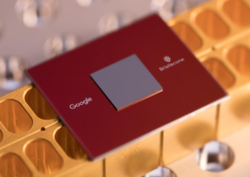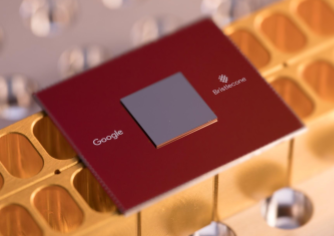
March 6, 2018
By: Michael Feldman
Google’s Quantum AI Lab has revealed it is testing a 72-qubit quantum processor in its bid to become the first company to demonstrate quantum supremacy.
 The chip, known as Bristlecone, was revealed on Monday at the annual American Physical Society meeting in Los Angeles. Given that you only need 49 or 50 qubits to demonstrate quantum supremacy – the capability of a quantum computer to outperform the largest supercomputers on certain computational tasks – a 72-qubit processor should be more than enough to achieve such a milestone. However, the error rates of such a system must be low enough so that it to be of practical use. Moreover, the ability to test a system for quantum supremacy is confounded by the very fact that classical computers cannot be used to compare test results.
The chip, known as Bristlecone, was revealed on Monday at the annual American Physical Society meeting in Los Angeles. Given that you only need 49 or 50 qubits to demonstrate quantum supremacy – the capability of a quantum computer to outperform the largest supercomputers on certain computational tasks – a 72-qubit processor should be more than enough to achieve such a milestone. However, the error rates of such a system must be low enough so that it to be of practical use. Moreover, the ability to test a system for quantum supremacy is confounded by the very fact that classical computers cannot be used to compare test results.
Julian Kelly, a research scientist at the Quantum AI Lab who presented Bristlecone at this week’s American Physical Society meeting, described the progress of their work in a Google Research blog post. In his writeup, he characterized the new chip as a “a testbed for research into system error rates and scalability of our qubit technology, as well as applications in quantum simulation, optimization, and machine learning.”
According to Kelly, the Bristlecone device uses the same coupling, control, and readout scheme employed on their older 9-qubit processor, but instead of using a linear array design, they created a square array of 72 qubits. The crux of the challenge is getting the larger chip to demonstrate similar error rates they were able to achieve on the 9-qubit hardware: 1 percent for readout, 0.1 percent for single-qubit gates, and 0.6 percent for two-qubit gates. “We believe Bristlecone would then be a compelling proof-of-principle for building larger scale quantum computers,” wrote Kelly.
But demonstrating low error rates is not just a matter of running a few tests on the new chip. They have to tune the whole technology stack, including the system software, the control electronics, and the chip itself. Kelley says getting all these things lined up for their 72-qubit processor will require some careful engineering and a number of iterations.
Such tweaking is likely to take months, so don’t expect Google to announce a breakthrough anytime soon. Nevertheless, Kelly is “cautiously optimistic” that they will be able to demonstrate quantum supremacy with Bristlecone at some point, noting that “the experimental demonstration of a quantum processor outperforming a supercomputer would be a watershed moment for our field and remains one of our key objectives.”
Image: Bristlecone processor. Source: Google Research
